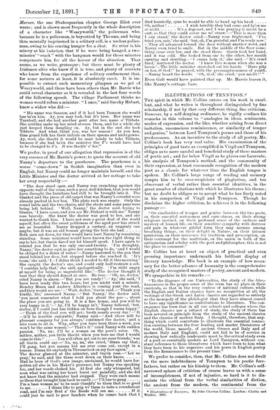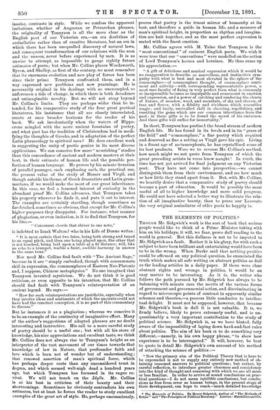ILLUSTRATIONS OF TENNYSON.* THE spirit in which Mr. Collins enters
on his work is excel-
lent, and what he writes is throughout distinguished by fine scholarship, if not by that very different thing, fine criticism. However, by a self-denying ordinance, he rigidly confines his remarks in this volume to "analogies in ideas, sentiments,
modes of expression, and the like, whether arising from direct imitation, unconscious reminiscence, or similarity of temper and genius," between Lord Tennyson's poems and those of his predecessors. As an incentive to the study of all poetry, Mr. Collins's book has very real value. His examination of the principles of good taste as exemplified in Virgil and Tennyson, obliges us to more careful and beneficial study of these masters of poetic art ; and far below Virgil as he places our Laureate, his analysis of Tennyson's method, and the community of their expression, at least commands recognition of the modern poet as a classic for whatever time the English tongue is spoken. Mr. Collins's large range of reading and memory tempts him to be over-suspicious of plagiarism, and too observant of verbal rather than essential identities, in the great number of citations with which he illustrates his theme ; but no doubt he obliges us to accept what he has finely noted in his comparison of Virgil and Tennyson. Though he disclaims the higher criticism, he achieves it in the following passage :—
" On similarities of temper and genius between the two poets, on their essential seriousness and earn-stness, on their strong religious instinct, on their profound sense of the sadness and mystery of human life, on their sensitive sympathy with distress and pain in whatever pitiful form they may assume among breathing things, on their delight in Nature, on their intense patriotism, on their reverence for tradition and prescription, on their contempt for the multitude, on the union in both of the antiquarian and scholar with the poet and philosopher, this is not the place to comment."
Mr. Collins has at heart an object of practical and even. pressing importance underneath his brilliant display of
literary knowledge. His bock is an example of how neces- sary for the better advance of humanity is the comprehensive study of the recognised masters of poetry, ancient and modern.
We sympathise in his remarks :—
"To the disgrace of our Universities, the study of the literw humaniores in the proper sense of the term has no place in their curricula, so that in the very centres of national culture, while the English and Italian classics have no recognition at all, the writings of the Greek and Latin classics are regarded so entirely as the monopoly of the philologist that they have almost ceased to have any significance as contributions to literature. The con- sequence has been that in all our schools and colleges where the English classics are a subject of study, the study of them has been severed on principle from the study of the ancient classics and the classics of modern Italy. I thought, therefore, that any- thing which could contribute to illustrate the essential connec- tion existing between the four leading and master literatures of the world, those, namely, of ancient Greece and Italy and of modern Italy and England, could not fail to be of service in showing how radically inadequate must be the critical study even of a poet so essentially modern as Lord Tennyson, without con- stant reference to those literatures which have been to him what they have been to his superiors and his peers in English poetry from the Renaissance to the present time."
We prefer to consider, then, that Mr. Collins does not dwell on the mere indebtedness of Tennyson to his poetic fore- fathers, but rather on his kinship to them. Mr. Collins's self- narrowed sphere of criticism of course leaves us with a sense of incompleteness, if not of injustice, so hard is it to dis- sociate the ethical from the verbal similarities of diction, the ancient from the modern, the continental from the
• Illustrations of Tenn von. By John Charton COMER. London : Chatto and Windus. 1891.
insular, contrasts in style. While we confess the apparent imitations, whether of Augustan or Petrarchan phrases, the originality of Tennyson is all the more clear as the English poet of our Victorian era,—an era doubtless of assimilative rather than of creative literature, but an era in which there has been unequalled discovery of natural laws, wad consequent transformation of our relations with the seen and the unseen, never before experienced by men. It is as unwise to attempt, as impossible to gauge rightly future estimates of poets ; but when Mr. Collins places Wordsworth, Byron, and Shelley, as first of the century, we must remember that its enormous evolution and new play of forces has been since their prime. Tennyson confronted them, and in a way expressed new problems and new yearnings. He is necessarily original in his dealings with so unexampled, so unforeseen a tide of change, in which there is both decadence and unimaginable novelty. But we will not stray beyond Mr. Collins's limits. They are perhaps wider than he in- tended, for his comparative study of the four great poetical literatures, his insistance that all are closely interrelated, create at once broader horizons for the reader of his book. We ask involuntarily when the waters of Hippo- crene mingled with the more ancient fountains of poetry, and what part has the tradition of Christendom had in modi- fying the thoughts of Greeks, and in adaptation of the perfect Latin phraseology to spiritual uses ? He does excellent work in suggesting the unity of poetic genius in its most diverse applications. We can conceive few more" nourishing" studies than this concordance of ancient and modern masters at their best, in their estimate of human life and the possible per- fection of human language. He proves by his minute iteration of parallel passages, each emplaasing each, the practical use, the present value of the study of Homer and Virgil, and though outside his theme, of Greek dramatists and Latin gram- marians, if we would make the most of our great inheritance. In this case, we feel a lessened interest of curiosity in the abundant proof Mr. Collins advances, that Tennyson takes his property wherever he finds it, and puts it out to interest. The examples are certainly startling, though sometimes so far-fetched, sometimes so obvious, that except for Mr. Collins's higher purposes they disappoint. For instance, what manner of plagiarism, or even imitation, is it to find that Tennyson, for his line,—
" Consonant chords that shiver to one note,"
is indebted to Izaak Walton ? who in his Life of Donne writes :
"It is most certain that two lutes, being both strung and tuned to an equal pitch, and then one being played upon, the other that is not touched, being laid upon a table at a fit distance, will, like an echo to a trumpet, warble a faint, audible harmony in answer to the same tune."
Nor need Mr. Collins find fault with "The Ancient Sage," because in it are "simply embodied, though with consummate skill in expression, the commonplaces of Eastern Neo-Platonic and, I suppose, Chinese metaphysics." No one imagined that Tennyson invented mysticism. We do not think it is good criticism, or even apposite to his intention, that Mr. Collins should find fault with Tennyson's reinterpretation of an ancient legend. He says :— " Row far such reinterpretations are justifiable, especially when they involve ideas and sentiments of which the ancients could not have had the remotest conception, it is no part of this commentary to discuss."
But he instances it as a plagiarism ; whereas we conceive it to be an example of the continuity of imaginative effort Many of the author's suggestions of adapted phrases are no doubt interesting and instructive. His call to a more careful study of poetry should be a useful one ; but with all his store of knowledge, his nice appreciations and excellent taste, we think Mr. Collins does not always rise to Tennyson's height as an interpreter of the vast movement of our times towards that knowledge of law in Nature, that profounder faith and love which is born not of wonder but of understanding ; that renewed assertion of man's spiritual force, which has perhaps deeper roots than any unconsidered trust in dogma, and which seemed well-nigh dead a hundred years ago, but which Tennyson has focussed in its vague re- vival. We will not touch on the Idylls. Mr. Collins is at his best in criticism of their beauty and their shortcomings. Sometimes he obviously contradicts his own estimates, but at least he forces the reader to study excellent examples of the great art of style. He, perhaps unconsciously, proves that poetry is the truest mirror of humanity at its best, and therefore a guide in human life, and a measure of man's spiritual height, in proportion as rhythm and imagina- tion are knit together, and as the most perfect expression is mated with the finest emotion.
Mr. Collins agrees with M. Taine that Tennyson is the "most conventional" of eminent English poets. We wish it were true that our " conventions " were modelled on the action of Lord Tennyson's heroes and heroines. He thus sums up his appreciation :—
" A gift of felicitous and musical expression which it would be no exaggeration to describe as marvellous, and instinctive sym- pathy with what is best and most elevated in the sphere of the commonplace—of commonplace thought, of commonplace senti- ment and activity—with corresponding representative power, a most rare faculty of fixing in very perfect form what is commonly so inexpressible because so impalpable and evanescent in emotion and expression, and a power of catching and rendering the charm of Nature, of meadow, wood, and mountain, of sky and stream, of tree and flower, with a fidelity and vividness which resembles magic ; and lastly, unrivalled skill in choosing, repolishing, and resetting the gems which are our common inheritance from the past : in these gifts is to be found the secret of his eminence. And these gifts will suffice for immortality."
In ghort, Tennyson has poetised the broad stream of modern English life. He has found in its levels and in its "grass of
the field" and "commonplace," a fine poetry which required and deserved as fine a setting as Virgil gave his epic. Living in a fluent age of metamorphosis, he has crystallised some of its best products. Were we to reverse Mr. Collins's method, how much might we not quote from Tennyson of which the great preceding artists in verse knew naught ! In truth, the time has not yet arrived for final judgment on any Victorian poet. They have not come into perspective,—we cannot
distinguish them from their environment, and see how much or how little they stand apart from it. But, with Mr. Collins,
we heartily desire that a comparative study of poetry should become a part of education. It would be possibly the most useful of all to higher knowledge and more solid progress.
He could not have selected a better way to illustrate the rela- tion of all imaginative beauty, than to prove our Laureate the very original assimilator of older poets he happily is.











































 Previous page
Previous page